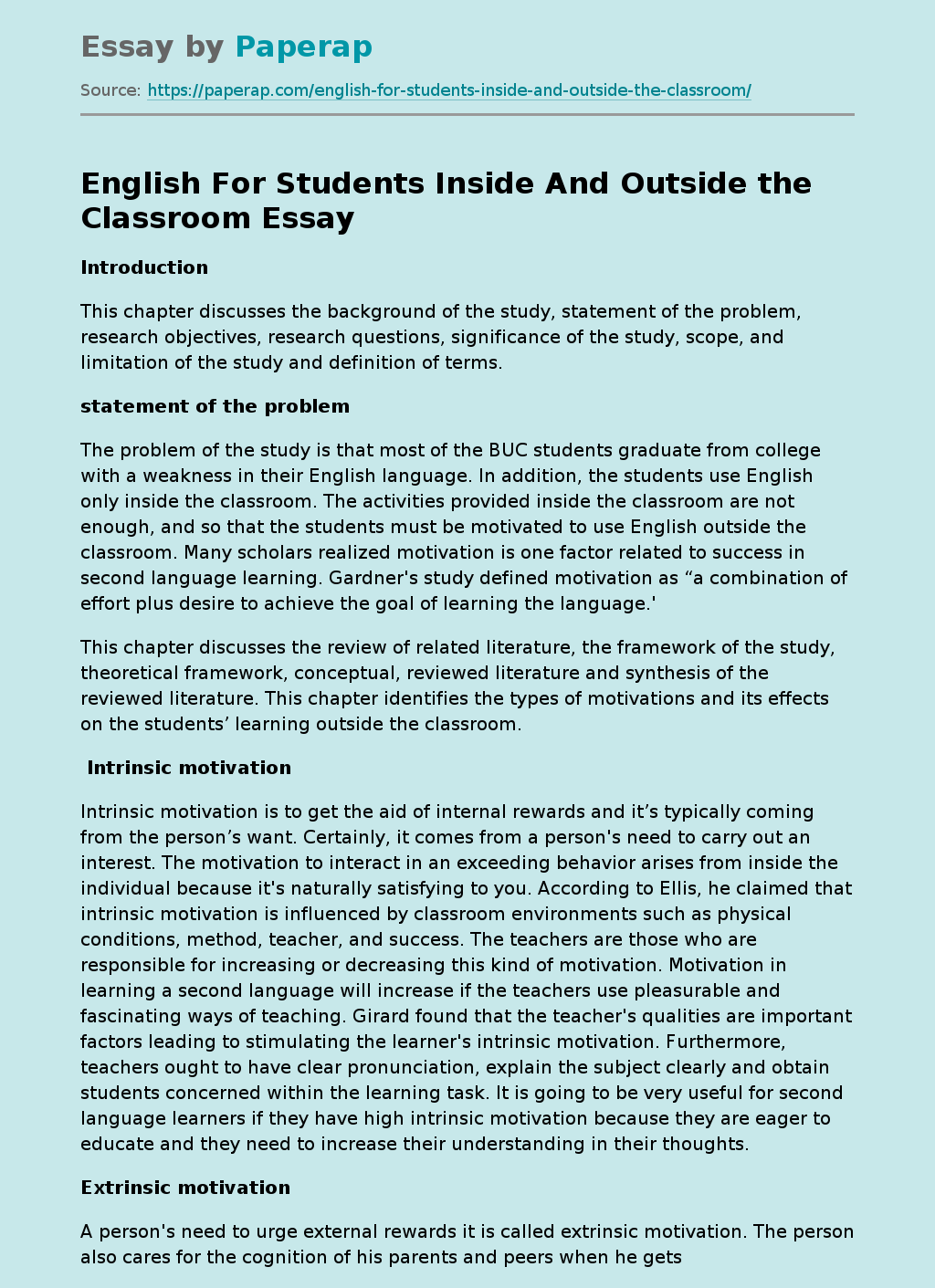English For Students Inside And Outside the Classroom
Introduction
This chapter discusses the background of the study, statement of the problem, research objectives, research questions, significance of the study, scope, and limitation of the study and definition of terms.
statement of the problem
The problem of the study is that most of the BUC students graduate from college with a weakness in their English language. In addition, the students use English only inside the classroom. The activities provided inside the classroom are not enough, and so that the students must be motivated to use English outside the classroom.
Many scholars realized motivation is one factor related to success in second language learning. Gardner’s study defined motivation as “a combination of effort plus desire to achieve the goal of learning the language.’
This chapter discusses the review of related literature, the framework of the study, theoretical framework, conceptual, reviewed literature and synthesis of the reviewed literature. This chapter identifies the types of motivations and its effects on the students’ learning outside the classroom.
Intrinsic motivation
Intrinsic motivation is to get the aid of internal rewards and it’s typically coming from the person’s want. Certainly, it comes from a person’s need to carry out an interest. The motivation to interact in an exceeding behavior arises from inside the individual because it’s naturally satisfying to you. According to Ellis, he claimed that intrinsic motivation is influenced by classroom environments such as physical conditions, method, teacher, and success. The teachers are those who are responsible for increasing or decreasing this kind of motivation.
Motivation in learning a second language will increase if the teachers use pleasurable and fascinating ways of teaching. Girard found that the teacher’s qualities are important factors leading to stimulating the learner’s intrinsic motivation. Furthermore, teachers ought to have clear pronunciation, explain the subject clearly and obtain students concerned within the learning task. It is going to be very useful for second language learners if they have high intrinsic motivation because they are eager to educate and they need to increase their understanding in their thoughts.
Extrinsic motivation
A person’s need to urge external rewards it is called extrinsic motivation. The person also cares for the cognition of his parents and peers when he gets high grades or praise from others. In addition, extrinsic motivation occurs to avoid punishment. An extrinsic reward could be a tangible and visual reward given to a person or worker for achieving something. According to second language learners, extrinsic motivation is very useful because it will encourage the learners to work hard to gain good grades. But, there is also a negative effect for the learners.
These rewards are usually monetary like a rise in earnings, or a monetary reward for activity well or a present certificate for going beyond the decision of duty. Furthermore, these rewards inspire and encourage staff as a result of cash or equivalent rewards are vital to the majority. Extrinsic rewards dissent from intrinsic rewards that are typically qualitative in nature like a difficult work assignment, involvement in key choices, a higher rank within the work hierarchy, etc. Extrinsic motivations are divided into instrumental and integrative motivation.
Integrative Motivation
Gardner stated that integrative motivation occurs when a person wants to communicate with the members of the target language or when a person wants to be part of a second language group. It is similar to Brown who claimed that this type of motivation refers to one’s wishes to integrate oneself within the culture of a second language group. Noels, Cle’ment, and Pelletier (2001) studied French Canadian students studying English in a summer course. The subject had to answer the questionnaires The students were required to answer the questionnaires about the reasons behind learning a second language, conception of competence and autonomy, effort exhausted in learning, motivation to pursue English studies, and course accomplishment. The outcomes of this study declared that the reasons behind learning English were students’ interest in attending to apprehend a people community higher and to achieve valued personal goals or tangible rewards, like job or course credits. Therefore, this type of motivation can then in turn help students to develop their proficiency within the target language.
Motivation, goals, ability to acquire a distant language, time, and many others are the main factors to high proficiency. It is unimportant whether students began to learn English early or later. This time is not the sole issue for perfect and imperfect outcomes. Teaching English in Oman is totally different from most European countries. Oman is one of the countries where learners are restricted only to room learning.
Students acquire a lot of benefits from learning outside the classroom. Learning outside the class is more motivated and has more impact and credibility. It also may bring most college subjects alive as they focus on real results and feelings. Thus the students will act positively to responsibilities, challenges, and opportunities to face risk and to deal with change. It is a brilliant way of enhancing classroom learning by the activities outside the classroom which allow students to use a variety of materials as well as teaching significant skills like cooperation and team building. Learning outside the classroom can, therefore, help students to be more receptive and open to learning inside the classroom.
English For Students Inside And Outside the Classroom. (2021, Dec 13). Retrieved from https://paperap.com/english-for-students-inside-and-outside-the-classroom/

